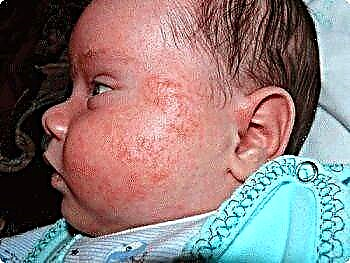Mesadenitis is a fairly common condition in children that causes pain in the abdomen. In many cases, the problem is resolved without treatment. It is sometimes difficult to diagnose because the symptoms are similar to appendicitis. Mesenteric infection means inflammation of the lymph nodes in the abdomen. How and why does it happen?

The baby has a stomach ache
Why are lymph nodes inflamed?
Lymph glands, also called lymph nodes, are present throughout the body. They are part of the immune system. During infection, the lymph nodes will enlarge and become painful, which is due to the body's struggle with bacteria and viruses. After the body has cleared the infection, the lymph glands return to normal.
Important! With mesenteric adenitis, the lymph nodes in the membrane (mesentery) that surround the large intestine and loops of the small intestine become inflamed and connect them to the abdominal wall. This usually occurs with intestinal infections, less often other infections.
Mesenteric infection in infants is rare, more often it is diagnosed in children over 2 years old, but such cases do occur.
The concept of mesenteric adenitis
The mesentery, in addition to attaching the intestines to the abdominal wall, performs a number of other functions. Here are the blood vessels, neuroreceptors, and lymph glands.
Important! Due to the complex structure and the importance of the functions assigned to it, many pathologies in the abdominal cavity arise precisely in the mesentery. One of them is mesenteric lymphadenitis (another name is mesenteric adenitis).
Symptoms of mesenteric lymphadenitis can appear over several days, less often weeks (chronic form). These include:
- abdominal pain, often in the lower right corner;
- enlarged lymph nodes;
- temperature rise;
- general weakness;
- rapid breathing and heartbeat.
It happens that nausea and vomiting, loose stools are observed.
Inflammatory factors
The main cause of inflammation of the lymph nodes in the intestines in a child is the penetration of infections. Conditionally pathogenic microorganisms that live in the intestinal flora (staphylococci, streptococci) can also be direct pathogens. When their number exceeds the norm due to the development of infectious diseases and insufficient immunity, opportunistic microorganisms can cause intestinal dysfunction and inflame the lymph nodes of the abdominal wall.

Mesenteric lymph nodes
Infectious diseases that can make the lymph nodes in the intestines inflamed in a child:
- gastroenteritis;
- intestinal infections;
- pneumonia;
- otitis media;
- pyelonephritis;
- tonsillitis;
- respiratory infections;
- vaginitis;
- cystitis.
Types of mesenteric lymphadenitis
If the mesenteric lymph nodes are enlarged in a child, this may mean that there was a primary pathology, and mesenteric adenitis is secondary. However, its course is not always the same. There is an acute form of the disease, characterized by significantly more pronounced symptoms (first of all, sharp, cramping abdominal pains). The chronic course of mesenteric adenitis is more prolonged, but also less painful for the patient.
Experts subdivide the disease into several types, determined by the pathogen:
- Non-specific. It is provoked by Escherichia coli, staphylococci and other pathogens. It occurs with reduced immunity and can be purulent and simple;
- Specific. It is caused by the influence of the tubercle bacillus (tuberculosis), the bacteria Yersinia enterocolitica (yersinia) and Yersinia pseudotuberculosis (pseudotuberculosis).
There are also varieties of mesenteric adenitis, which are determined by the way the infection enters the lymph nodes: blood and lymph are transported through the digestive tract or it is carried.
Diagnostic methods
When there is a suspicion that the lymph nodes in the child's stomach may become inflamed, various diagnostic methods are performed.
To make a diagnosis, the doctor will likely:
- Collect data about the child's medical history. In addition to information about current symptoms, you will need information about previous illnesses, baby's nutrition, travel and illness of relatives;
- Palpate the baby's abdomen to detect the presence of swelling, feel that the lymph glands of the mesentery have increased in size;

Palpation of the abdomen
- Send the patient to the laboratory for research. You will need a blood test (biochemical and general) that can help identify the presence of an infection in the baby and its type. In some cases, studies of feces and urine will be required;
- Schedule a visual test if necessary. Since the mesenteric lymph nodes are not accessible for review, special diagnostic methods are needed, such as ultrasound of the abdominal organs and computed tomography.
Important! First of all, mesenteric adenitis must be differentiated from Crohn's disease and appendicitis.

Ultrasound of the abdominal cavity for babies
Possible complications
Mesenteric lymphadenitis can lead to complications in rare cases, only if it was not treated on time (treated incorrectly), or the infant's immunity is lowered. The most dangerous is suppuration of the lymph nodes. Possible consequences of pathology:
- Abscess. Inflammatory process in the abdominal cavity requiring surgical intervention;
- Dehydration if the patient has severe diarrhea and vomiting;
- Sepsis, or general blood poisoning. This is possible when pathogens enter the bloodstream;
- Bowel obstruction. It happens when the mesenteric lymph nodes, which are enlarged in the child, squeeze the intestinal loops;
- Peritonitis, or inflammation of the membrane that surrounds the abdominal organs. The patient dies without immediate surgery.
What doctor treats mesentery
Treatment of mesenteric adenitis is performed by a gastroenterologist or therapist, in children - by a pediatrician and usually depends on the cause of the problem.
Therapies
There is no special treatment for mesenteric adenitis, it is not always necessary.
Important! You need to treat the root cause of inflammation of the mesenteric lymph nodes, that is, bacterial and viral infections.
Therapies are mostly symptomatic. Uncomplicated cases of mesenteric adenitis and virus-related illnesses usually resolve in a few days or weeks.
Medicines used in treatment may include:
- Pain relievers and antipyretics (except aspirin, as it increases the risk of Rayet's syndrome in children);
- Antibiotics are prescribed for moderate to severe bacterial infections;
- Drugs needed to boost immunity, vitamins, antihistamines.
In complicated cases, hospital treatment will be required.
At home, you need to do the following:
- Get plenty of rest. This will help the child recover;

Baby resting
- To relieve pain, put a warm, damp cloth on the abdomen;
- If diarrhea and vomiting are observed, then it is necessary to drink water in small sips at short intervals. The baby can be given a teaspoon of it every 10 minutes.
Children's doctor E. Komarovsky says that the best way to prevent inflammation of the mesenteric lymph nodes is to take preventive measures against infections that can provoke mesenteric adenitis. If, nevertheless, an increase in lymph nodes has occurred, then in most cases the edema regresses even without special therapy, as the primary disease is treated. However, only a doctor can determine whether it is dangerous or not, therefore, when the baby has signs of mesenteric infection, he should be observed by a pediatrician.
Nutrition for mesenteric adenitis
During mesenteric lymphadenitis, the baby must adhere to a special diet:
- Meals should be more frequent and portions small;
- It is advisable to exclude whole milk and dishes from it. Dairy products can be consumed;
- When the child receives complementary foods, it is necessary to cook only for steam, boil food in water or bake in the oven
- Meat and fish should be with a minimum amount of fat, the use of butter is also limited;
- From fruits and berries, you need to cook jelly and compotes, and not eat them fresh;
- Porridge can be cooked from oatmeal, buckwheat or rice. At the same time, it is better to cook them initially in water, adding a small amount of milk only at the end of cooking;

The baby is fed with porridge
- It is good to give your baby a rosehip decoction, medicinal chamomile tea.
Foods not to be consumed
It is prohibited to use:
- whole milk;
- fatty foods;
- boiled and fried eggs (only soft-boiled eggs are allowed);
- fresh fruits and vegetables;
- fresh bread and baked goods;
- sweets, just a little honey.
The main thing for parents
When an infant has abdominal pain, parents should prepare for a visit to the doctor to speed up the diagnosis and increase the likelihood of correctness.
What information does the doctor need:
- A description of all the symptoms of the ailment when they started. It is advisable to measure the temperature several times and record the results;
- Information about the vaccinations carried out, the transferred diseases;
- The names of all medications the child takes, their doses;
- Events preceding the onset of pain.
If necessary, the doctor will conduct additional research. The baby needs constant supervision from the parents until an accurate diagnosis is made and appropriate treatment is carried out.



